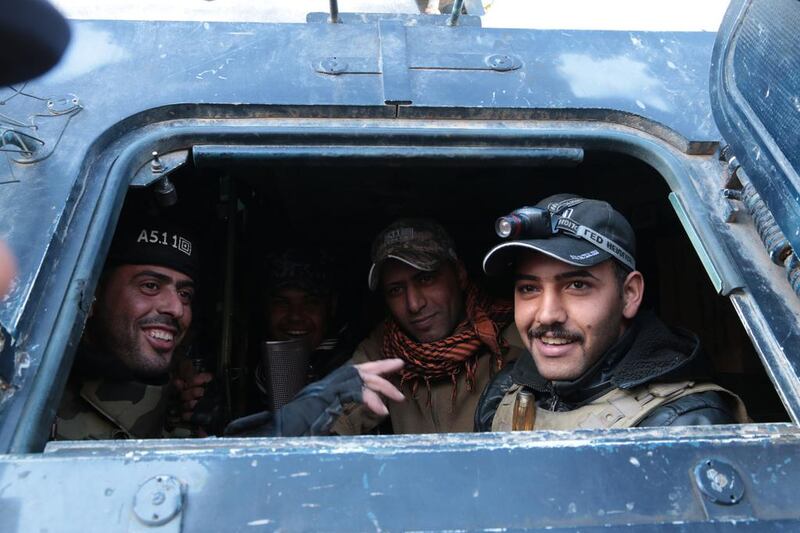MOSUL, IRAQ // Shortly after a lunch of rice and chicken, the soldiers picked up their rifles and moved into position. They had been advancing through the Mosul neighbourhood of Hay Sumer since dawn, and had paused for some sustenance and a well deserved break.
As the locals watched from their doorways, the men lined up on the side of the quiet residential street, and filed out at the command of their officer. They paused briefly at the street corner and then raced across the exposed crossroads towards cover, zigzagging their way through the suburban sprawl.
Before turning the final corner, the platoon bunched together to pose for a few snaps on their mobile phones. The soldiers cheerfully flashed victory signs, then spun around and turned left into enemy territory. Eyes darting and fingers on triggers, they advanced down a road in which every building could be an enemy position; where every window, every door, any movement could spell danger.
At the end of the road, the platoon joined up with a unit that had advanced from another direction. The soldiers halted, and began to bang at the metal gates of houses, shouting to inform the inhabitants of their liberation.
Inside one house stood Colonel Raed Saleh, the commander of the other unit, giving orders to his men.
Next to him stood the owner, an elderly man in a brown thobe, who had burst into tears when he realised that ISIL’s reign of terror had come to an end. A soldier walked up to embrace him, another offered him a cigarette.
“Daesh is very weak in this area. We advanced to here from Intisar [neighbourhood] in a week,” said Col Saleh, describing the steady progress made by Iraqi forces as they pushed towards the Tigris river from Mosul’s eastern outskirts.
The platoon moved on, supported by a Humvee and an armoured vehicle painted in the blue camouflage of Iraq’s federal police. On its flanks, other units moved forward as Iraqi forces systematically extended their control of the area.
At another turn in the road, the armoured vehicle opened up with its heavy machine gun, spraying bullets at a suspected ISIL resistance nest. Rifle fire crackled, and a soldier discharged his shoulder-fired grenade launcher at the building. When no return fire was forthcoming, the advance continued until the platoon reached a stretch of farmland that lies between the neighbourhood and the Tigris.
The soldiers combing through Hay Sumer belong to an elite outfit known as the Rapid Response Forces, which were deployed to eastern Mosul early in January to ramp up the pressure on ISIL. Along with additional federal police units they have provided the extra manpower that, together with increased support by US special forces, has speeded up the Iraqi advance on the east bank of the Tigris.
Hay Sumer and adjacent neighbourhoods had been an isolated pocket of ISIL resistance since Iraqi special forces reached the Tigris last Sunday, cutting off the south-east from the centre and preventing the insurgents from strengthening their defences there.
The few remaining militants are terrified, often surrendering or retreating without offering a fight, according to a militant captured by the Rapid Response Forces earlier that day.
“Daesh fighters are scared and want to escape. Their morale is very low. They hide in the houses for fear of air strikes,” he said. He was a hulk of a man, with a bushy beard. His hands and feet tied, he sat blindfolded on the floor of a house commandeered by the military. The soldiers had covered him in a blanket to keep him warm, and he obediently answered any question thrown at him.
With ISIL banished, life returned to Hay Sumer. Families stood outside their houses, warmly greeting the soldiers that had brought them freedom. At the behest of the military, they had rolled their cars into the street, creating a multi-layered defence against the suicide car bombs that have inflicted heavy casualties among Iraqi forces and civilians.
Children milled about, and the men wasted no time in walking to neighbouring districts in search of food. Supplies had run low since the battle for Mosul commenced in November, and on the main roads a steady stream of men returned to their homes carrying eggs, vegetables and other foodstuff from the markets that have sprung up in liberated areas.
The government and international aid agencies are failing to bring sufficient supplies into the city, and it is down to private enterprise to keep its inhabitants fed.
“I will go down to Gogjali to buy food soon. I want to open a vegetable stand here,” said Tawfik Raleb, whose street had been liberated in the morning.
Fawaz Saud, a taxi driver and father of three, was relieved that his family had not come to any harm in the fighting. He had last seen ISIL fighters in his street at around seven in the morning, he said. They were anxious and aggressive, and threatened to shoot civilians who watched their retreat. Iraqi troops moved past his house two hours later, ending the tension that had built up as the front line drew close.
“We were so happy when the army arrived. The day before, we were too afraid to even come to the garden,” said Mr Saud.
In the late afternoon, ISIL began launching mortars into the area, but the residents of Hay Sumer paid little heed to this parting shot from the defeated militants. In one street, a police car had cranked up its speakers, drowning out the explosions with the first music to echo through the neighbourhood since the insurgents stormed Mosul in 2014.
foreign.desk@thenational.ae





